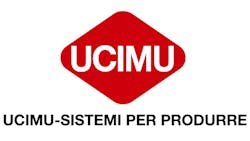Italian machine-tool builders endured a 16.8% drop in orders during the third quarter of 2012 compared to the like period of 2011, according to researchers with UCIMU, the trade group that represents Italy’s manufacturers of machine tools, robots, and automation systems. The new result follows a 20.6% year-on-year decrease in orders during the second quarter of 2012, and a 10.5% year-on-year increase during the first quarter.
UCIMU declared that the new result is due to the negative results from machine tool builders’ domestic and export sales, though not in equal proportions. Export orders during the recent period declined by 11.8% versus the third quarter of last year, and that result actually represents an “acceptable” result as it shows a slight increase over the 2005 baseline figure.
However, the negative trend for domestic Italian orders continued with a 42.6% reduction compared to the third quarter of 2011, a result that is less than 20% of the baseline figure. “Only during the third quarter of 2010 were worse results recorded,” the group explained, and it shows how the continuing decline in domestic consumption has driven Italian machine tool builders to try to react by increasing exports.
Italy is among the EU nations affected most seriously by the continent's sovereign debt crisis, which is straining financial reserves for lenders and thereby inhibiting capital investments.
UCIMU president Luigi Galdabini said the “strong predisposition to internationalization (by) Italian companies” should be recognized as a consequence to an abatement of IRAP — the regional income taxes that all manufacturers pay on income earned in Italy.
However, UCIMU said results of the recent BI-MU trade expo in Milan had been encouraging, with more than 58,000 attendees, and most of these machine shop operators.
“Together with the first impressions collected from the exhibitors, these numbers show a rather peculiar situation,” Galdabini commented: “… in Italy, in spite of the uncertain situation, there is the desire to invest in capital goods, probably with more determination than in the recent past. The problem is the inability to turn the interest of the demand into reality, due to the lack of liquidity suffered by the companies, which during the 2010-2012 period have suffered a significant decrease in financing from credit institutions …”.
He observed that the Italian government’s recent introduction of a “mini-bond” system — effectively, reducing the manufacturers’ minimum equity requirements on loans for new capital investments — may be the right approach for encouraging business owners to move ahead with their expansion or improvement programs.
Galdabini called on the Italian government “to initiate a discussion workshop, including bank and company representatives, the protagonists of the mini-bond system, to define and agree the operating details of the activity.
“If, as it is now clear, one of the main problems of the Italian economy is the lack of liquidity,” he added, “it is necessary to stimulate and support as much as possible the tools that can make it easier for companies to access funds.” A similar easing of credit terms is sought on leasing activity, too, the group president said.
“The oxygen guaranteed by these types of interventions aimed at reinstating liquidity in the real economic system of the country, must however be accompanied by a structured economic policy aimed at promoting a recovery of trust with the consumers across the whole production chain," according to Galdabini.
The UCIMU president used the occasion to call for Italian government officials to reestablish discussions on “structural and infrastructural intervention plans” by the private and the public sector. That, he opined, would be the first step toward re-launching Italian economic growth because it would support a revival in capital-goods investments, “for which we hope, we repeat once again, that a ‘free amortization’ system be put in place.”
About the Author
Robert Brooks
Content Director
Robert Brooks has been a business-to-business reporter, writer, editor, and columnist for more than 20 years, specializing in the primary metal and basic manufacturing industries.
